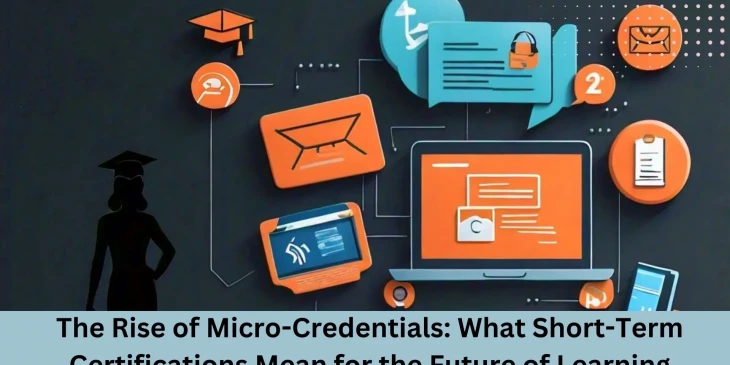Is earning a traditional degree the only way to secure a successful career? In today’s fast-paced world, the answer quickly shifts towards "no." Micro-credentials—short-term certifications that offer targeted learning—are emerging as a powerful alternative to conventional long-term degree programs. As industries rapidly evolve, the need for quick, flexible, and affordable learning solutions has become more apparent. Micro-credentials are meeting that demand, offering learners a new pathway to professional development and career advancement. But what exactly are they, and why are they gaining so much traction?
A Changing Landscape: Why Micro-Credentials Matter
In a time when technology is advancing at lightning speed, industries are facing constant disruptions. Jobs that didn’t exist a decade ago, like AI specialists and blockchain developers, are now some of the most in-demand roles globally. According to the World Economic Forum, by 2025, 50% of all employees will need reskilling. This trend underscores the growing importance of continuous learning in the modern workforce.
Enter micro-credentials, a practical solution to bridge the skills gap. Unlike traditional degrees that can take years to complete, micro-credentials offer learners the ability to acquire specific, job-relevant skills in a fraction of the time. These certifications are often recognized by employers, providing a fast track to career growth without the heavy time and financial commitment of a full degree program.

What Exactly Are Micro-Credentials?
Micro-credentials are bite-sized courses that focus on a particular skill or set of skills, often in high-demand fields such as digital marketing, data analytics, project management, and cybersecurity. These certifications can typically be earned in a few weeks to a few months, depending on the complexity of the topic. Delivered through online platforms or hybrid models, micro-credentials offer flexibility, making them accessible to a wide range of learners, including working professionals, career switchers, and even students looking to supplement their academic education.
How Micro-Credentials Are Changing the Job Market
The job market is no longer just about degrees—it's about skills. Employers today are more focused on hiring individuals who can bring specific, up-to-date skills to the table. In fact, a report by LinkedIn highlights that 74% of hiring managers now prioritize skills over education when evaluating candidates. This growing emphasis on skills has made micro-credentials a valuable asset in job applications, providing clear evidence of expertise in a specific area.
For instance, imagine you are an HR professional looking to specialize in diversity and inclusion. Instead of enrolling in a full degree program, which could take years, you could complete a micro-credential in Diversity & Inclusion Management in just a few months. This certification not only enhances your skills but also makes you more marketable for specialized roles in your field.

Industry Leaders Are Adopting Micro-Credentials
Leading organizations have already recognized the value of micro-credentials. Tech giants like Google, IBM, and Microsoft are now offering micro-credential programs that are directly aligned with industry needs. Google’s Grow with Google initiative, for example, provides short-term certifications in high-demand fields like data analytics, IT support, and project management. These certifications are designed to equip learners with the practical skills employers are looking for, increasing their employability in a competitive job market.
The credibility of these programs is backed by industry recognition, with many employers now accepting micro-credentials as proof of proficiency. A survey by IBM found that 43% of employers say micro-credentials are as effective as college degrees when evaluating job candidates, and this number is only expected to grow.
The Financial and Time-Saving Benefits
One of the most appealing aspects of micro-credentials is their affordability. While traditional degrees can cost tens of thousands of dollars, micro-credentials are significantly more affordable, often ranging from a few hundred to a couple of thousand dollars. This makes them an attractive option for those looking to enhance their skillset without taking on a heavy financial burden.
Additionally, the time-saving aspect cannot be overstated. Traditional degrees require years of study, while micro-credentials can be completed in weeks or months, allowing learners to quickly apply new skills to their current job or explore new opportunities. This quick turnaround makes them especially beneficial for working professionals who may not have the time to commit to long-term study.
Real-World Examples: How Micro-Credentials Lead to Career Advancement
Take the case of Sarah, a marketing professional who wanted to specialize in digital marketing to stay relevant in her field. Instead of returning to school for a master’s degree, Sarah opted for a micro-credential in digital marketing analytics. Within four months, she completed the program and immediately applied her new skills in her current role. As a result, she was promoted to a digital marketing strategist position, a role that came with a significant salary increase.
Another example is John, an IT support technician. John wanted to transition into cybersecurity, but the idea of enrolling in a long-term degree program was daunting. He chose a micro-credential in cybersecurity fundamentals, which took him just six months to complete. Soon after, John secured a new job in the cybersecurity field, earning a higher salary and working in a more specialized, in-demand area.
The Future of Learning: Why Micro-Credentials Are Here to Stay
The global market for micro-credentials is expected to grow significantly, with projections estimating it will reach over $30 billion by 2030. As more companies recognize the value of targeted, skills-based education, the demand for micro-credentials will continue to rise. This growth isn’t limited to tech fields—industries like healthcare, education, and finance are also seeing an increasing demand for specialized certifications.
At Allegiance Educare, we offer a variety of micro-credential programs tailored to the needs of today’s job market. Whether you’re looking to upskill in your current role or explore new career opportunities, our courses provide the practical, real-world knowledge you need to succeed. With flexible learning options and industry-recognized certifications, you can gain the skills employers are looking for without disrupting your life.
Micro-credentials are not just a trend but shaping the future of learning and work. As industries evolve and the demand for specific skills grows, these short-term certifications provide a flexible, cost-effective way to stay competitive. Whether you're a professional looking to advance in your career or a student seeking to supplement your education, micro-credentials offer a pathway to success in today’s rapidly changing job market.
So, why wait? Invest in your future today. Explore Allegiance Educare's micro-credential programs and take the next step toward career advancement. Register Now!
_XOOrt.png)



Leave a Comment
To post comment, please